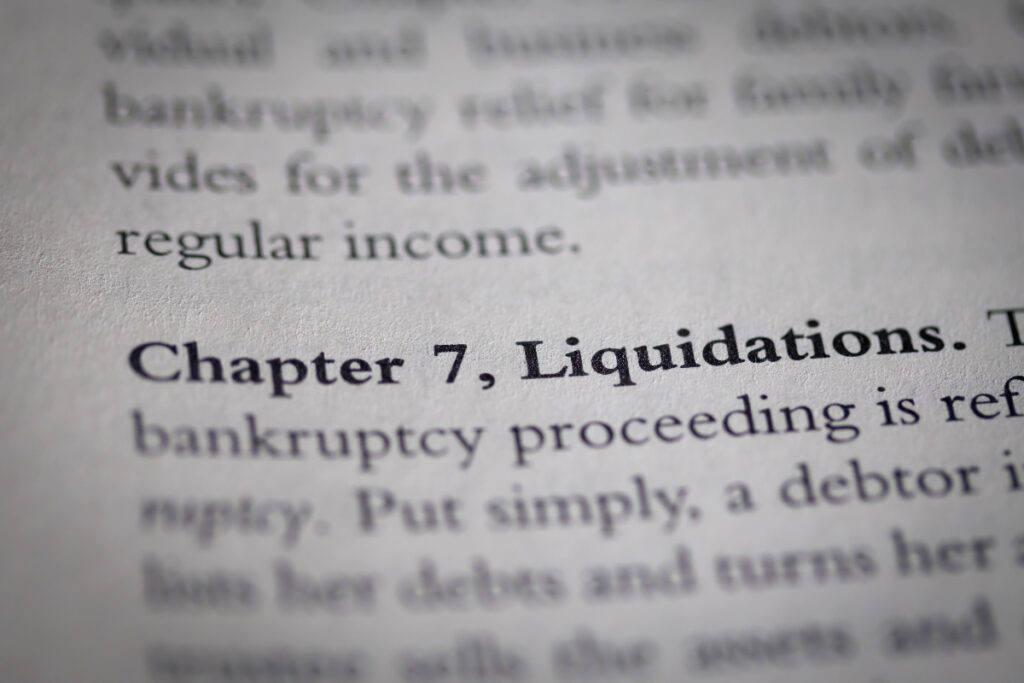
Depending on your specific financial pitfalls and financial history, filing for Chapter 7 in Georgia may or may not be the best choice for you to become debt-free. Get the facts about filing Chapter 7 bankruptcy specific to Georgia.
Valuable information is highlighted on what this chapter of bankruptcy entails, what you stand to lose when you file Chapter 7, and some tricks for filing Chapter 7 in Georgia state. We will also explain why CMC Law is your best choice for legal counsel in and around Atlanta regarding a Chapter 7 Georgia bankruptcy.
Demystifying Chapter 7 Bankruptcy in Georgia
Chapter 7 bankruptcy, prevalently filed in Georgia, is a legal remedy enabling individuals and businesses to wipe out their debts and start anew. It is designed for those grappling with financial difficulties and unable to repay their obligations. The process involves liquidating assets to repay creditors, with a bankruptcy trustee overseeing the case and managing the sale of non-exempt assets.
While filing Chapter 7 in Georgia offers immediate relief from creditor harassment, wage garnishment, and other collection activities, it’s crucial to understand what you stand to lose when you file Chapter 7. Contact an experienced bankruptcy attorney to understand the implications of filing for Chapter 7 in Georgia.
How is Chapter 7 Bankruptcy Different from Chapter 11 or Chapter 13 Bankruptcy?
- A Chapter 7 trustee is selected to translate the debtor’s assets into cash to distribute among creditors.
- There is no repayment plan created for the debtor in a Chapter 7 bankruptcy case as one does in Chapter 13. Instead, the bankruptcy trustee must sell the debtor’s nonexempt assets and use this money to pay claims holders (creditors) by the provisions of the U.S. Bankruptcy Code.
- Debt liquidation under Chapter 7 is available to people who cannot regularly pay monthly toward their debts.
- Businesses or high-income earners looking to terminate their enterprises may file for Chapter 7 in Georgia.
- Chapter 7 provides relief to debtors no matter how much debt they owe or whether a debtor is solvent or insolvent.
Federal Tax Refunds in Bankruptcy
A debtor can receive tax refunds during a bankruptcy, but they may be subject to delay, turnover requests by your trustee, or used to pay off your tax debts. Is all or part of why you are filing Chapter 7 bankruptcy because of overdue federal tax debt? You may need to increase your withholding and/or estimated tax payments. Get help determining the proper withholding by seeking legal counsel from an experienced bankruptcy attorney. You can use the IRS Tax Withholding Estimator for help in the meantime.
Discharge
After your Chapter 7 bankruptcy filing, you will receive a debt discharge that releases you from personal liability (only for certain dischargeable debts). Some taxes may be dischargeable. The discharge of federal tax debt depends on each bankruptcy case’s unique facts and circumstances. Hiring legal counsel is the best way to file bankruptcy, with the highest chance of successfully discharging debt. Work with a bankruptcy lawyer to determine which tax debts may be discharged.
Tricks for Filing Chapter 7 in Georgia
- Take full advantage of the U.S. bankruptcy laws and get the fresh start you want by not continuing to incur additional debt after you file for Chapter 7 in Georgia.
- Eligibility for Chapter 7 requires passing the means test, which compares your income to Georgia’s median income. If your income falls below the median, you may qualify.
- Make sure to sign up for credit counseling from an accredited agency within a 180-day period before filing Chapter 7. A seasoned bankruptcy lawyer in Georgia can help you navigate the process efficiently, assist in gathering required documents, and provide direction throughout the entire Chapter 7 bankruptcy process.
Bankruptcy Exemptions for Chapter 7 in Georgia
Knowing what you lose when you file Chapter 7 in Georgia is vital. Exemptions are laws that protect certain property types from liquidation, ensuring you can retain essential assets after bankruptcy. These exemptions in Georgia cover a broad range of properties, allowing you to maintain ownership while eliminating qualifying debts.
Engaging an experienced bankruptcy attorney ensures you maximize the exemptions available, provides guidance throughout the bankruptcy process, protects your assets, and helps you achieve a fresh financial start.
Chapter 7 in Georgia Bankruptcy Process and Timeline
The Chapter 7 bankruptcy process in Georgia involves preparing and filing a petition with the Georgia bankruptcy court with detailed information about your financial situation. Once your petition is filed in the system, an automatic stay is created, halting all collection efforts by creditors.
While Georgia’s Chapter 7 bankruptcy process is generally straightforward, potential issues may arise. A knowledgeable bankruptcy attorney who understands the bankruptcy laws is essential to navigating these challenges and ensuring the best possible outcome for your case.
Understand that you will not lose everything you own, which is one of the biggest myths of filing for bankruptcy. Specifically in Georgia, most people tend to keep everything they own when filing for bankruptcy. Most importantly, working with a bankruptcy attorney allows for the highest rate of successful bankruptcy filing.
Choosing a Bankruptcy Attorney
When planning to file Chapter 7 in Georgia, finding a trustworthy and experienced bankruptcy attorney to guide you is crucial. A specialized Chapter 7 bankruptcy attorney can offer numerous benefits and enhance your chances of a successful outcome.
At CMC Law, the founder is one of the most experienced and reputable Chapter 7 bankruptcy attorneys. Charles M. Clapp is dedicated to helping individuals and families achieve financial freedom.
Here at CMC Law, we are committed to helping Georgians understand bankruptcy law’s complexities and how to use it to discharge debts, regain control of their finances, and embark on a debt-free lifestyle.
Contact us today to schedule a debt consultation. Take the first big step toward a brighter financial future with a licensed and seasoned bankruptcy attorney fighting for you.
